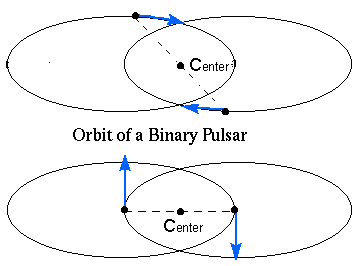 Binary Pulsars
Binary Pulsars The most famous binary radio pulsar is the Hulse-Taylor pulsar, PSR 1913+16, which has another neutron star as its companion. The two stars are so close that their orbital period is less than eight hours, but no matter streams between them; they interact only by their mutual gravitational attraction. The orbit of the pulsar can be described in great detail because the arrival times of its pulses at the Earth are like the ticks of an accurate clock. (shown here)
The orbital period is now known to be reducing by 67 nanoseconds
(less than one ten-millionth of a second) each orbit.
The reducing orbital period represents a loss of energy, which
can only be accounted for by gravitational
radiation. Although gravitational radiation itself has never
been observed directly, the observations of PSR 1913+16 have
provided good proof of its existence.

Pulsar Planets
Against all expectations, the first confirmed planetary
system beyond our own was found, in 1991, in orbit
around a pulsar. The object in question is a millisecond
pulsar known as PSR 1257+12. The discoveries of
several other planets around millisecond pulsars,
made using the pulsar timing method, have since been
announced, though in most cases these are awaiting
confirmation. The nature and origin of these strange
worlds is a matter of debate.
(click here to see a
diagram of the planets..)
Gamma Ray Bursts and Magnetars
Magnetars are believed to be the strongest magnets in the galaxy.
Classified by observers as Soft Gamma Repeaters (SGRs) and Anomalous
X-ray Pulsars (AXPs), these cosmic powerhouses are city-sized,
spinning, highly-magnetized neutron stars. A magnetar's
magnetic field is estimated to be 1,000,000,000,000,000x
that of Earth. A magnet this strong, located half the distance to the
Moon would erase your credit cards and suck
pens out of your pocket.
At the surface of the magnetar, its powerful magnetic field is thought to buckle and shift the neutron star crust generating the intense high-energy flares seen as SGRs. Click Here for a map locating all the known Magnetars.